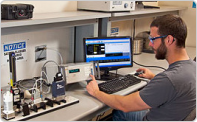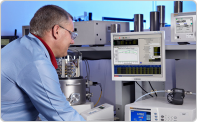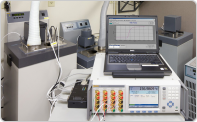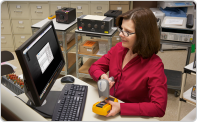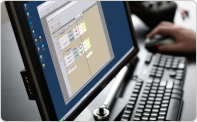- Other Fluke companies:
- Fluke
- Fluke Biomedical
- Fluke Networks
- Fluke Process Instruments

Calibration Software
What is calibration software?
Calibration software is used to manage calibration data, asset and inventory data, and compliance data. It is designed to help automate all or part of the calibration process, allowing you to increase your productivity and throughput. Fluke Calibration offers various types of calibration software, including data-logging software, calibration automation software, calibration procedure databases, and add-on and plug-in software programs.
What are calibrated tools?
Calibrated tools are devices that have been measured and adjusted against a known value to ensure accuracy and consistency of their readings. In order to calibrate tools, the process involves comparing the measurement readings of the tool to a reference standard of known accuracy. The device under test (DUT) is then adjusted to ensure it is providing accurate measurements within a specified range. Tools need to be regularly calibrated so they can continue to provide accurate measurements and work can continue running smoothly.
Why use calibration management software?
Using software to automate all or part of the calibration process as well as manage your reporting and measurement data offers several advantages.
Consistency
Automating the calibration process ensures that the steps taken are performed exactly the same way every time, no matter the operator or location. This improves the quality of results, reduces errors, and standardizes methods.
Efficiency
Calibration software allows technicians to set up tests and then go on to perform other tasks. The automation component follows the procedure laid out for it, while the data logging and data management pieces keep the information organized, making more efficient use of a technician’s time. Calibrations are typically completed much more quickly following this method, saving time and money.
Reporting and document storage
Calibration automation software typically includes features for documenting calibration procedures, storing calibration data, and producing reports. This allows you to eliminate paper records or spreadsheets.
Compliance management
Because calibration software does such a wonderful job of keeping accurate records of all parts of the calibration process, it can also help you comply with a wide variety of quality standards. It can also help you comply with a wide variety of quality standards, including:
What is a calibration system?
A calibration system is a process or set of procedures that ensures the accuracy and reliability of measuring or testing devices over time. A calibration system typically consists of the following components:
- Calibration management software: This is a software system used to manage and track the calibration process, including scheduling, record-keeping, and reporting.
- Calibration procedures: Documented instructions for performing calibrations on specific instruments or equipment. The right calibration software ties in to your calibration equipment so you can automate all or part of the steps to ensure consistent, repeatable results.
- Calibration standards: Reference standards of known accuracy used to verify the device under test.
- Calibration records and certificates: Documents that record the results of each calibration and any adjustments made to the instrument.
- Calibration scheduling: Scheduling calibrations at regular intervals to ensure that instruments continue functioning properly and within the specified tolerance limits.
A well-designed calibration system tracks and manages every component of the calibration process to ensures that instruments are calibrated at the appropriate intervals, showing accurate and reliable results.
What should you look for when selecting calibration software?
When selecting a calibration software, there are several factors to consider ensuring you choose the best option for your needs. Here are some things to look for:
Workload coverage and features
The first thing you want to do is look over your calibration instruments and the workload you need to cover. The software you select should be compatible with them and any tools you may add to the workload in the future. Look for software that is a scalable solution to grow with you, something that offers features such as automatic scheduling, reminders, and notifications, to help manage the calibration process efficiently.
Ease of use
The software should be user-friendly and easy to navigate, with clear instructions and an intuitive interface. Fluke Calibration software is designed by calibration experts and metrologists, individuals who understand the calibration process from beginning to end.
Customization and efficiency
Choose software that allows you to customize calibration procedures and reports to meet your specific needs. Find an option that is flexible to fit your needs. Being able to adjust the software to suit your specific needs will help you reduce costs and run your lab more efficiently in the long run.
Unified data management
Look for software that integrates with the other systems you use. You want something that supports unified data management across different metrology disciplines. No matter the discipline you’re working with, you want to be able to manage all the information in one database.
Types of Calibration
- Electrical calibration
- Temperature calibration
- RF calibration
- Pressure calibration
- Humidity calibration
- Flow calibration
- Process calibration
Regulatory and quality compliance
You may want to, or be required to, support the traceability and record-keeping requirements of modern quality and accreditation standards. Make sure your calibration software complies to relevant industry standards, including ISO/IEC 17025, ISO 9000, QS 9000, EN 45000, ANSI Z540, and MIL STD 45662A, without having to write your own programs, set up your own databases, or test and document the system.
Support and training
You want software that is backed with reliable customer support, including training and troubleshooting help. Fluke Calibration offers the MET/SUPPORT Gold program to provide premium support and services for MET/CAL®software users. Look for other types of available support as well, including user groups, online forums, technical and application notes, and other informative materials.
- Home
- Products
- New Products
- Electrical Calibration
- RF Calibration
- Data Acquisition and Test Equipment
- Temperature Calibration
- Humidity Calibration
- Pressure Calibration
- Flow Calibration
- Process Calibration Tools
- Calibration Software
- Service and Support
- All Calibration Instruments
- Purchase Info
- News
- Training and Events
- Literature and Education
- Service and Support
- About Us
Sidebar Request a Quote
Request a quote


